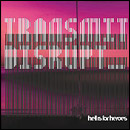“Have we enough to keep it together?”
Humans are remarkable optimists. God knows why.
There’s a line near the end of Annie Hall where Woody Allen watches the rehearsal for a play based on his own collapsed relationship. At the end, he admits; “you're always trying to get things to come out perfect in art because it's real difficult in life.” That statement never seemed truer than with The Libertines.
For the past year you’ve been chasing an ambulance. Pete Doherty’s demise is reported with gruesome, stained-syringe precision; music critics turn philosophers theorising over rock ‘n roll’s descent into self-destruction; a new band’s coverage gets cut in order to cover (mis)quotes from Doherty/Barat giving hope/despair that the band will survive/split. The world rolls over and yawns...
So why have so many of us been willing to watch this miserable affair unfold for so long? In the faint, feeble hope that out of the ashes of their sanity, from the ruins of their relationship, these two scrawny songsmiths could fashion something remarkable. Something that could tower above the break-ins and break-ups, the tabloid tales and the heroin hits. Something that could stand as a perfect artistic testament to a damaged, derailed and fucked-up life. It’s like a kid on a council estate praying she gets a pony for Christmas.
From the very start, The Libertines is the sound of the band at its most muzzled; paralysed by poor production, underdeveloped songs and private lives that have become more sensational and noteworthy than the music. With guitar lines that don’t seem to know what to do with themselves, What Katie Did is a dawdled mid-tempo affair that never raises itself above sounding like a lost session track; Don’t Be Shy decides after about two minutes that it doesn’t want to be a pop song anymore and trails off into some kind of sub-Stone Roses jam session that they just don’t have the musical competence to pull off; and if they thought that speeding up the bass-heavy, tin-pan chords towards the end of Campaign of Hate would’ve added an ounce of energy to a tune that was dead on arrival, then they’re seriously deluded.
Which raises questions as to what exactly The Clash’s Mick Jones did to this record. If his aim was to fashion the album into the same kind of masterpiece of passion and melody as London Calling, then he has failed - the album is as poorly-recorded, as shabby and hollow-sounding as a set of demos. And if his aim was to reign-in Doherty’s attention-deficit songwriting and set the bar as high as the finest moments on their debut, then he has failed again - tracks such as Tomblands, The Saga and Arbeit Macht Frei showcase all the band’s vein-burstingly brilliant energy, but are no-where near the perfectly-formed anthems found in the likes of Time For Heroes and Boys In The Band.
Still, we have to make some concessions. While Can’t Stand Me Now would’ve merely sounded okay on the last record, here it shines as one of the few admirable moments, and Music When The Lights Go Out begins as a bruised acoustic strum that rocks the same tender lilt that sounded so touching on Wolfman’s For Lovers. Then finally, after thirty-five minutes of painful misfires, comes a shot of brilliance. On the closing What Became Of The Likely Lads, melodies drop off Barat & Doherty’s tongues like diamonds that have fallen off the back of a truck, complete with a breakneck backing that features the same soul, fire, romance and nostalgia they always promised us.
This review started from the belief that The Libertines should be an exceptional, era-defining rock ‘n roll band. Some will say they never were. Some will say they still are. But the excitement that exploded around them was because many people saw a goose-pimpling promise that they’d only just started to fulfil. But while it’s still too early to start writing the band’s obituary, we have to face the even more uncomfortable truth that the group may be nothing more than another band of false messiahs. A band that grew out of the hype they helped feed; that gave you glimpses of greatness, but never anything substantial to hold onto; that self-mythologized The Albion as though they sailed some spiritual graceland, and even more deceptively, that they were gonna take you with them.
“What became of the likely lads? We’ll never know.” As imperfect in art as they are in life, *The Libertines *have set their own detonator. And the fuse is rapidly running out.
-
4Neil Robertson's Score






















